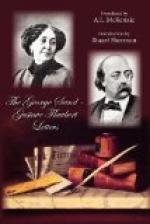The people ferocious? No, it is not imbecile either, its real trouble is in being ignorant and foolish. It is not the people of Paris that has massacred the prisoners, destroyed the monuments, and tried to burn the town. The people of Paris is all who stayed in Paris after the siege, since whoever had any means hastened to breathe the air of the provinces and to embrace their absent families after the physical and moral sufferings of the siege. Those who stayed in Paris were the merchant and the workman, those two agents of labor and of exchange, without whom Paris would exist no longer. Those are what constitutes positively the people of Paris; it is one and the same family, whose political blunders cannot restore their relationship and solidarity. It is now recognized that the oppressors of that torment were in the minority. Then the people of Paris was not disposed to fury, since the majority gave evidence only of weakness and fear. The movement was organized by men already enrolled in the ranks of the bourgeoisie, who belong no longer to the habits and needs of the proletariat. These men were moved by hatred, disappointed ambition, mistaken patriotism, fanaticism without an ideal, sentimental folly or natural maliciousness—there was all that in them—and even certain doctrinaire points of honor, unwilling to withdraw in the face of danger. They certainly did not lean on the middle class, which trembled, fled or hid itself. They were forced to put in action the real proletariat which had nothing to lose. Well, the proletariat even escaped them to a great degree, divided as it was by various shades of opinion, some wanting disorder to profit by it, others dreading the consequences of being drawn in, the most of them not reasoning at all, because the evil had become extreme and the lack of work forced them to go to war at thirty sous a day.
Why should you maintain that this proletariat which was shut up in Paris, and was at most eighty thousand soldiers of hunger and despair, represented the people of France? They do not even represent the people of Paris, unless you desire to maintain the distinction between the producer and the trader, which I reject.
But I want to follow you up and ask on what this distinction rests. Is it on more or less education? The limit is incomprehensible if you see at the top of the bourgeoisie, cultivated and learned people, if you see at the bottom of the proletariat, savages and brutes, you have none the less the crowd of intermediaries which will show to you, here intelligent and wise proletarians, there bourgeois who are neither wise nor intelligent. The great number of civilized citizens dates from yesterday and many of those who know how to read and write, have parents still living who can hardly sign their names.
Would it then be only more or less wealth that would classify men into two distinct parties? The question then is where the people begins and where it ends, for each day competencies shift, ruin lowers one, and fortune raises another; roles change, he who was a bourgeois this morning is going to become again a proletarian this evening, and the proletarian of just now, may turn into a bourgeois in a day, if he finds a purse, or inherits from an uncle.




